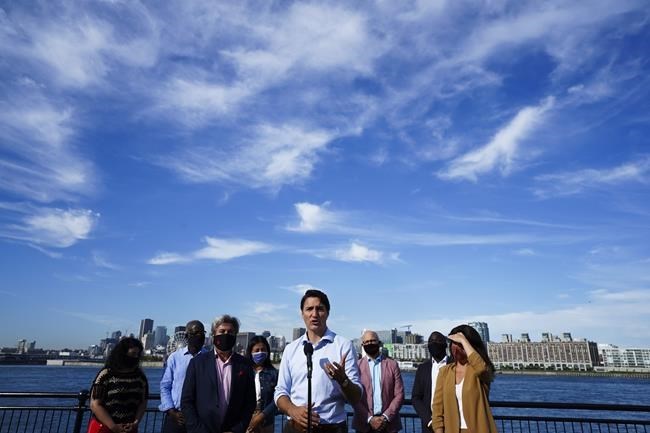OTTAWA — Federal leaders pointed fingers at each other Thursday over the spiralling COVID-19 crisis in Alberta, each seeking to forge a link in voters' minds between the province's dire health emergency and the others' policies.
A day earlier, Alberta Premier Jason Kenney reintroduced limits on gatherings along with elements of a vaccine passport system — after months of resistance — as he declared a public-health emergency that is threatening to soon overload intensive care units.
Liberal leader Justin Trudeau said Conservative politicians across the country have not been as effective in fighting the pandemic and questioned whether Tory Leader Erin O'Toole should be sitting across from them at the premiers' table.
"Just a few days ago Mr. O’Toole was still applauding Mr. Kenney for his management of the pandemic," Trudeau said in Montreal, claiming that "anti-vaxxers within his own party run the show."
"He won’t demand that all his candidates get vaccinated. He doesn’t criticize his candidate who wasn’t fully vaccinated who goes into seniors’ homes," he said, referring to Michelle Ferreri, the Tory candidate for Peterborough-Kawartha who posted photos of herself to social media canvassing in a retirement residence despite having received only one shot.
Trudeau said ventilators are en route to Alberta and that he has asked Canada's top civil servant to "offer any support we can," including seconding medical professionals to infection hot spots.
Minutes later at an event in Saint John, N.B., O'Toole pinned the deteriorating situation in the province largely on Trudeau while avoiding any mention of Kenney's name, despite being asked about him repeatedly by reporters. He said the Liberal leader let the Delta variant gain a "bigger hold" than necessary and proceeded to trigger an election amid a surging fourth wave.
"Rather than double up our resources to fight this Delta spread, he called an election. The $600 million this election costs could be helping all provinces in their fight," he said.
O'Toole, a former military helicopter pilot, said he will be the "wingman to the provinces" in the battle against COVID-19.
In Toronto, New Democrat Leader Jagmeet Singh said Kenney bears the blame but insisted Trudeau must share responsibility, since he set off an election campaign that has soaked up attention and resources and sent candidates canvassing across the country ahead of voting day on Monday.
"There's no question that Mr. Kenney is to blame here and that his leadership has been horrible. But it doesn't also dismiss the fact that Mr. Trudeau called an election while the fourth wave was hitting hard — while everyone knew that it was going to hit," Singh said.
He also criticized the Liberal leader for not expanding paid sick leave, though the party has now pledged to do so in its platform.
The NDP plans to change its tactics on the ground to adapt to Alberta's unfolding crisis, Singh added, but offered no specifics, saying an "assessment" is underway.
The province is asking for help from its neighbours to use their intensive care beds and staff while prepping its triage protocols, which would see doctors forced to choose who gets life-saving treatment and who does not.
"We may run out of staff and intensive care beds within the next 10 days," Kenney said Wednesday.
"Unless we slow transmission, particularly among unvaccinated Albertans, we simply will not be able to provide adequate care to everyone who gets sick."
Alberta has 269 patients in intensive care in a system set up for 173. Of the patients in ICUs, 218 have COVID-19 — the vast majority unvaccinated or partially vaccinated.
This report by The Canadian Press was first published Sept. 16, 2021.
Christopher Reynolds, The Canadian Press



